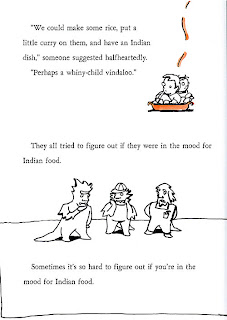Monsters Eat Whiny Children written and illustrated by Bruce Eric Kaplan

My husband, by way of his family, introduced me to the joys of The New Yorker magazine when we met some twenty-plus years ago. While I always felt good about myself for wanting to read those very long articles about interesting, intellectual, cultural things and those top-notch short stories that filled the pages, nine times out of ten I ended up poring over the magazine just to read the cartoons and maybe a movie review or two. While I always aspired to something more, I contented myself with the knowledge that plenty of cartoonists for The New Yorker (William Steig, Bob Staake, Peter de Sève, Roz Chast to name a very few) were also children's book illustrator/authors. Add to this list Bruce Eric Kaplan and his excellent new book, Monsters Eat Whiny Children, published in 2010.
I love this book for so many reasons, from the spare but expressive artwork to the humor that might be lost on children and, best of all, the timeless trop of children-eating monsters. While I love everything about Monsters Eat Whiny Children, what I love most is Kaplan's writing, especially the straightforward, generous narrator who recognizes that life is tough and we all have our struggles, even if we are whiny-children eating monsters. Also, Kaplan does not talk down to children in an effort to include them in the jokes or buffer the potential nightmare-inducing concept of the story. Monsters Eat Whiny Children begins, "Once there were two perfectly delightful children who were going through a TERRIBLE phase, which is to say they whined ALL day and night." Their father warns them, but they do not listen. A monster steals them and takes them to his "lair on the bad side of town."
The monster plops Henry and Eve into a lovely wooden bowl and begins to make a salad. The children begin to whine about the wooden bowl and sitting on lettuce. At this point, while the monsters are increasingly scary and capable, they also begin to reveal very human natures. When the monster's wife walks into the kitchen and tastes the salad dressing she screams, "I hate cilantro!" She insists her husband start over and add paprika to the dressing. When he complains that he does not like paprika, she replies with menace, "You LIKE paprika." The monster has to take the children outside, hose the old dressing off them and start all over.
Before he is done with the new dressing, a neighbor drops and berates the monsters for wasting whiny children on a SALAD. Why, he has been dreaming of whiny-child burgers all week! The wife grumbles but agrees with the change of plans, knowing it will mean she will have to clean off the grill, which is disgusting. This goes on and on as the monsters are unable to get the fire started, causing the neighbor's cousin to kick a hole in the fence. Then they consider making a cake of them but the monster's wife thinks her bottom is too big and she should not eat cake, plus she hates baking. A simple dish of rice and a nice "whiny-child vindaloo" gets them all thinking for a time but, as the narrator thoughtfully notes, "Sometimes it's hard to figure out if you are in the mood for Indian food."
Kaplan accomplishes the amazing feat of writing a story that is irresistible to children (monsters eating children) and infinitely entertaining to parents. I have read this book several times at story time in the last few weeks and had kids who thought they weren't interested slowly get closer and closer until they are sitting down and just as engrossed in the story as everyone else within hearing range. I have seen parents smile and remove the book from the place where I have prominently displayed it and read it to their kids. This is just a really great, funny subversive book that you won't get tired of reading. Kids love cautionary tales, they love seeing other kids in danger or getting punished in all the ways that they fear and they love to breath a sigh of relief at the end when everything turns out well, if not happily.
Kaplan ends his book with the monster's aunt, "angry at the world as she always was," who walks in and tells the group exactly what they should do with the whiny children. Actually, she yells it at them and spits a little as she does because of her "saliva problem." They all agree that whiny-child cucumber sandwiches sound ideal, the narrator telling us that it's "such a relief for finally figure out what the right thing to eat is." As they assemble the ingredients (a recipe for cucumber sandwiches is included in the book) and search for "fluffy white bread" instead of the "healthy twelve-grain bread" that is the only thing the monster has eaten in years, the children, who have been playing quietly with balls and cars the monster's wife has been slipping to them, notice an open window and casually take their leave, hand in hand. Don't worry, the monsters have almost as happy an ending. Although they no longer have whiny children, they all seem content to tuck into plain cucumber sandwiches in their absence.
Kaplan leaves us with the knowledge that Henry and Eve have learned a lesson and never whine again. Well, almost never.
I just love Jenkin's author's note in Love You When You Whine:
|





